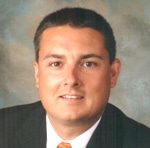Upon the urging of SMART, the Will County Board passed a resolution supporting the Federal Railroad Administration’s (FRA) proposed two-person crew rule. The deadline to submit comments on the propose rule is May 16, 2016. Click here to submit your comments.
Will County Board passes resolution supporting FRA’s proposed two-person crew rule

Guy
JOLIET, Ill.—A coordinated effort recently among SMART TD and SMART led to the passage of a resolution in support of FRA’s proposed two person crew rule by the Will County Board.
The resolution passed unanimously last Thursday at the regular meeting of the Will County Board after passing unanimously out of the Legislative Committee on April 12.
“When FRA announced its Notice of Proposed Rulemaking for two person crews, SMART TD State Directors were encouraged to garner support for the pending rule,” said SMART TD Illinois State Director Robert W. Guy.
“What better way to show support than by having a rail-intensive community pass a resolution in support of FRA’s proposed rule and submitting it as part of the docket,” Guy said.
The strong relationship between our Illinois members of SMART TD and SMART really paid off in this effort.
“Once we got our marching orders from our national legislative office I met with Don Moran,” Guy said. “Brother Don is a Business Representative for SMART Local 265 out of Carol Stream, but also serves on the Will County Board.”
“When I briefed Don on the pending rule he immediately saw the potential negative implications for his community should rail carriers be allowed to operate trains with a lone crew member,” Guy said. “He was more than happy to introduce and shepherd through the supportive resolution.”
“The overwhelming support for the resolution is a testament to Don’s hard work,” Guy said. “We owe a big thank you to Don and his colleagues on the Board.”
“The ground work that Don accomplished really showed when I addressed the Board at their meeting last week,” Guy said. “After explaining what the proposed rule would do the Board passed the resolution unanimously.”
That local support should way heavy on FRA when they consider all comments received in regards to the proposed rule. It’s communities like Will County that have the potential to suffer most if rail carriers are allowed to operate trains with one crew member.
“This kind of support reinforces the results of the extensive polling SMART-TD has conducted over the past few years regarding crew size,” Guy said. “Citizens overwhelmingly have shown that they don’t want trains running through their communities with less than two people on board.”
The Resolution as passed by the Will County Board:
RESOLUTION OF THE COUNTY BOARD
WILL COUNTY, ILLINOIS
Resolution in Support of FRA Crew Size Rule
WHEREAS, the safe operation of freight and passenger trains are vital to commerce; and Will County supports efforts to keep train operations safe in our (state, county)
WHEREAS, the Federal Railroad Administration (FRA) has published a notice of proposed rulemaking (NPRM) regarding adequate staffing on trains, a factor we believe is
vital to ensuring safe train operations; and
WHEREAS, national studies show that a minimum of two on-board crew members are vital to operate a train safely and minimize the likelihood of train-related accidents; and
WHEREAS, virtually all trains in North America are already operated by crews of at least two individuals, making the economic impact of this proposed rule minimal; and
WHEREAS, the FRA agrees that, while advancements in automated technology such as Positive Train Control (PTC) systems improve railroad safety, they are not a substitute for a train’s on-board crew members.
NOW, THEREFORE BE IT RESOLVED, that the Will County Board hereby supports the Federal Railroad Administration’s proposed ruling, requiring that trains operated in America be operated by no less than a two-person crew.
BE IT FURTHER RESOLVED, that the County Clerk shall send a copy of this Resolution to the United States Department of Transportation in the form of comments in support of the proposed federal rule.
BE IT FURTHER RESOLVED, that the Preamble of this Resolution is hereby adopted as if fully set herein. This Resolution shall be in full force and effect upon its passage and approval as provided by law.